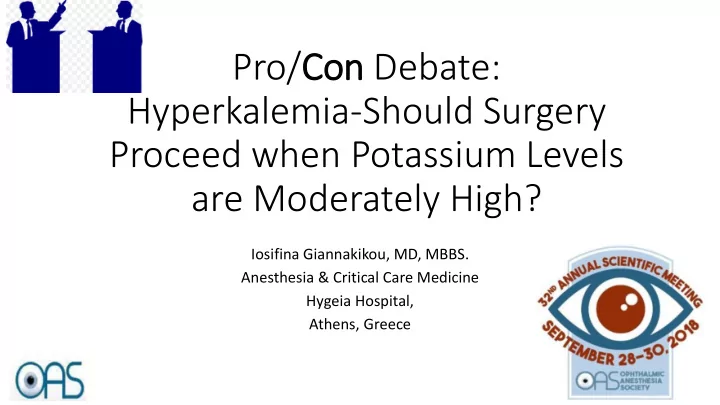

Pro/Con Debate: Hyperkalemia-Should Surgery Proceed when Potassium Levels are Moderately High? Iosifina Giannakikou, MD, MBBS. Anesthesia & Critical Care Medicine Hygeia Hospital, Athens, Greece
Hyperkalemia • Definition • Causes • Clinical manifestations • Evidence • Conclusion
Definition • Normal K: 3.5-5.3 mEq/L • Hyperkalemia: K > 5.5 mEq/L • Common electrolyte disorder (2.5% of hospitalized pts) McDonald. Investigating hyperkalaemia in adults. BMJ (clinical research ed).351:4762
Causes • Pseudohyperkalemia • extravascular hemolysis • Decreased excretion • Renal failure, ACEI, ARBs, K-sparing diuretics, adrenal inhibition, aldosterone levels. • Intracellular release • Succinylcholine, acidosis, digoxin, Massive cell death (tumor lysis syndrome, rhabdomyolysis, burns, crush injuries, hemolysis, blood transfusion, ischemic reperfusion, MH) • Increased intake • K-supplementation
Succinylcholine • Succinylcholine muscle depolarization causes transient increase in serum K (0.5-1 mEq/L) • Life threatening increases in serum K in situations with: • proliferation in the number of nicotinic receptors • 3 rd degree burns, spinal cord injuries, neuromuscular diseases. Grontre. Pathophysiology of hyperkalemia induced by succinyl choline. Anesthesiology 1975;43:89-99
• Sux 1mg/kg given to pts with neuromuscular disease • 15/40 pts: K 1-6mEq/L • Degree and extent of muscle paralysis correlate with relaxant- induced hyperkalemia Cooperman. JAMA 1970;213(11):1867-1871
• 17 yo fit male for elective circumcision • No sign PMH, no previous anesthesia Hx • Isoflurane anesthesia used, no sux • Cardiac arrest in PACU • K>13 mEq/L, CK>70,000 U/L • Undiagnosed Becker’s muscular dystrophy Poole. BJA 104(4):487-9 (2010)
• Cardiac arrest in healthy children within 24hrs of anesthesia • 25 arrests (in 3 years) • 92% males, minor surgery, median age 4 yrs old • 92% inhalational anesthetic • 72% and/or succinylcholine • 72% had hyperkalemia • 48% undiagnosed Duchenne dystrophy or unspecified myopathy • 67% of arrests associated with hyperkalemia Larach. Clin Pediatr (Phila). 1997 Jan;36(1):9-16
Acidosis • Acidosis can cause hyperkalemia by moving K extracellularly • 98% of total body K is intracellularly • pH by 0.1 serum K by 1 mEq/L • Common causes of acidosis during anesthesia • respiratory acidosis (hypoventilation) • metabolic acidosis (diabetic ketoacidosis in a fasted diabetic, circulatory or hemorrhagic shock, hyperchloremic acidosis with 0.9% NS) Sendak. Principles and Practice of Anesthesiology. 1998
• Massive blood transfusion liberates K • K accumulated during blood preservation • 20 mEq/L of K in 1 unit of blood stored for 21 days Parthasarathy. J Anesth Clic Pharmacology 2007; 23(2): 129-144
• Prolong fasting (16-26 hours) in ESRD • Fasting hyperkalemia (due to insulinopenia) Gifford. Kidney Int. 1989; (35):90-94
• K>9 mEq/l induced by K sparing diuretics Berkova. Biomed Pap Med Fac Univ Palacky Olomouc Czech Repub. 2014;158(1):84-91
• 49 yo on ACEI for large lipoma surgery • pre-op K: 4.5 Cr: 0.7 • 2.5 hr later: tall T wave, K 8.07 mEq/L, Gluc 327 mg/dL Park. Korean j Anesthesiol. 2011;61(2):175-176
Clinical manifestations • Asymptomatic – mild elevations • Cardiac effects • Neuromuscular effects
Cardiac effects • Bradycardia • Heart block (1 st , 2 nd , 3 rd ) • Asystole • AV & intraventricular conduction abnormalities • Ventricular flutter, VT, persistent VF • Lethal arrhythmias • Severely depressed myocardial contractility
EKG changes • PR prolongation • Peaked and narrowed T waves • Loss of P waves • Widening of QRS complex • Sine wave (markedly widened QRS complex merges with T wave) • Ventricular Fibrillation • Asystole
Double counting of HR Hyperkalemia-CORE EM
• 90 cases of K>6 mEq/L • EKG read by cardiologist • 46% had EKG changes Montague. Clin J Am Soc Nephrol. 2007;3(2):324-330
An. Critical Care 2012,16:R225
Note: EKG vs K • Poor sensitivity of EKG to detect hyperkalemia • EKG changes can be “non - classic” • i.e. AV blocks, SB, ventricular and AV junctional escape rhythms • EKG changes not necessarily occur in order • i.e. jump from peaked T waves to sine wave • Clinical course is unpredictable • sudden death can occur in the absence of sentinel EKG changes • patients with preexisting EKG abnormalities and new hyperkalemia can present with normalization of the EKG
Goyal. JAMA. 2012;307(2):157-164
Duration of hyperkalemia • Chronic hyperkalemia is better tolerated in chronic RF patients • Degree to which tolerance is increased is not known
Einhorn. Arch Intern Med. 1009;169(12):1156-1162
Neuromuscular effects • Paresthesia • Weakness • Depressed deep tendon reflexes • Respiratory depression • Flaccid paralysis
• 80 yo on oral & iv K-supplementation pre-op for K • postoperative hyperkalemia K >7.6 mEq/L • induced residual neuromuscular blockade necessitating ventilatory support Wilbanks. AANA J 2005;73:437-41
Factors influencing decision • Urgency of surgery • Severity/Type of surgery • Presence of renal insufficiency • Duration of hyperkalemia • Hyperkalemia related reduced contractility • Hyperkalemia related conduction disturbance • Presence of systemic disease that may be aggravated by K • Presence of metabolic imbalances that may aggravate K
Postpone elective surgery for K > 5.5 mEq/L • Insensitive and non-specific ECG changes to hyperkalemia • Unknown tolerance of chronic hyperkalemic patient to acute in K • Unexpected change of metabolic status • Unexpected need for succinylcholine administration • Unanticipated change from a short minor case to a long complicated case • Undiagnosed myopathy
Recommend
More recommend